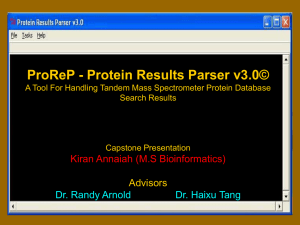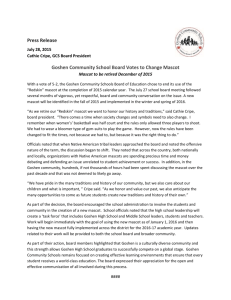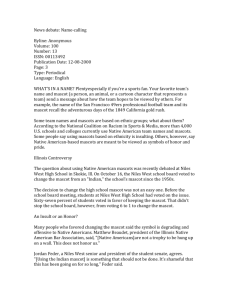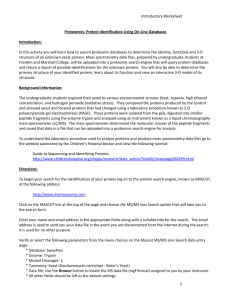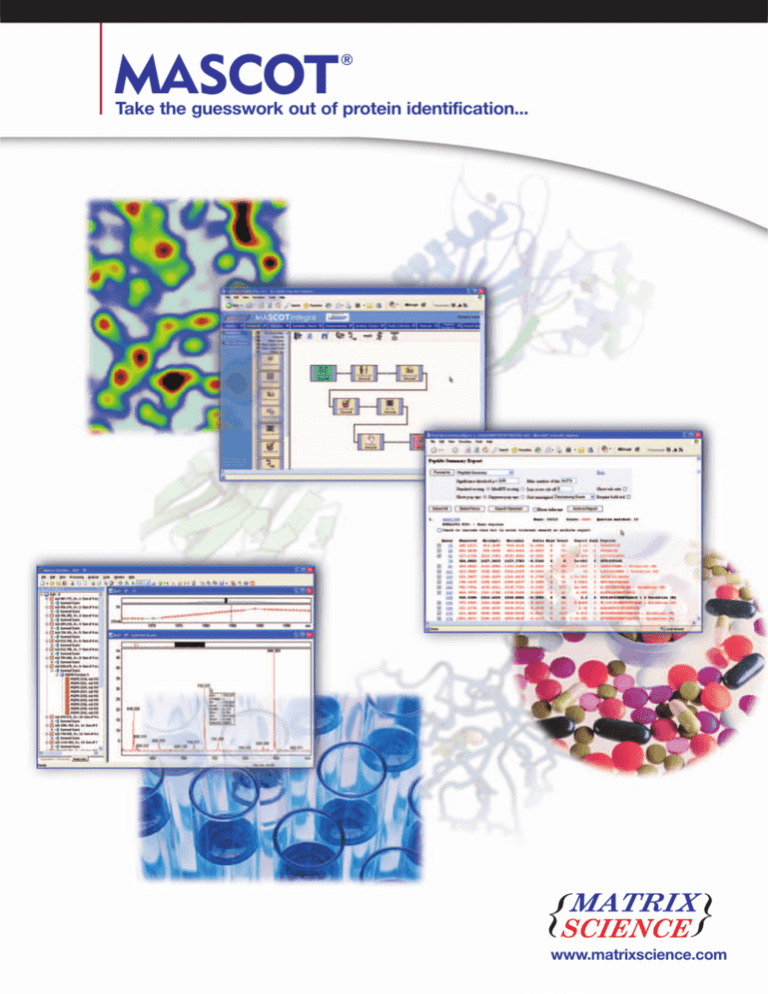
MASCOT
®
Take the guesswork out of protein identification...
www.matrixscience.com
MASCOT®: SOFTWARE FOR PROTEIN IDENTIFICATION USING
MASS SPECTROMETRY DATA
Proteomics is the study of the protein complement of a cell or
tissue in a specific physiological state. The core technologies of
proteomics are gel electrophoresis and HPLC for separation followed by mass spectrometry for analysis. Mascot takes the
mass spectrometry data and searches it against molecular
sequence databases to identify the constituent proteins and to
characterize post-translational modifications. The search procedure is computationally intensive, requiring complex statistical
calculations to be performed rapidly while streaming through
protein or nucleic acid sequence databases.
Mascot has become established as the de facto standard for this application,
because of advantages such as these:
Supports all three proven search strategies in a single,
integrated package
Sophisticated client software to automate search submission
without custom programming.
Unique, true probability based scoring allows standard
statistical tests of significance to be applied.
Summary and detail reporting of search results to any web
browser, together with comprehensive, on-line help.
Search any FASTA database, whether protein, EST, or
genomic DNA.
Licensed for in-house use by more than a thousand academic
and commercial laboratories. Described by Frost & Sullivan
as “the gold standard for the searching of databases with
mass spectrometric data”.
No time-consuming index building; total flexibility in
specifying chemical or post-translational modifications;
search with or without enzyme specificity.
Accepts mass spectrometry data from all the leading
instrument manufacturers
Fast, threaded code gives high throughput on a wide range
of single and multi-processor systems and clusters.
2
Supported by a dynamic and independent company, committed
to developing state-of-the-art bioinformatics software.
SUPPORTS ALL THREE PROVEN SEARCH STRATEGIES
IN A SINGLE, INTEGRATED PACKAGE
One of many approaches to proteome analysis is to use 2D gel electrophoresis to separate and visualise the proteins in a cell lysate. Individual spots, containing one or a few
proteins, are then excised and digested with trypsin. Mass spectrometric analysis of
the intact digest mixture from a spot provides a set of peptide molecular masses for a
Peptide Mass Fingerprint search. This is a rapid and sensitive technique, but may fail
if the digest mixture represents a complex mixture of proteins.
Protein
Enzyme
digest
Fragment
ions
Peptide
mixture
Gas phase
fragmentation
MS/MS
Stage I
Isolated
peptide
MS/MS
Stage II
MS/MS
spectrum
Peptide
map
Peptide
molecular
masses
For protein mixtures, or where greater
specificity is required, a digest can be
separated by HPLC, coupled directly to
an MS/MS instrument. Individual peptides
are then selected and induced to fragment,
yielding MS/MS spectra. A Mascot
MS/MS Ions Search looks for the best
peptide sequence match to each MS/MS
spectrum, then groups these peptide
matches into protein matches. This technique is applicable to even the most
complex protein mixture, such as those
generated by digesting a cell lysate
without any gel separation step.
The third type of search supported by
Mascot is a Sequence Query, a powerful
and flexible tool that allows molecular
and fragment ion mass values to be combined with amino acid sequence and
composition data.
Fragment
ion mass &
intensity values
MASCOT
SEARCH ENGINE
Protein/DNA
sequence databases
Protein
identification &
characterisation
3
UNIQUE, TRUE PROBABILITY BASED SCORING ALLOWS STANDARD STATISTICAL TESTS OF
SIGNIFICANCE TO BE APPLIED
Mascot computes the probability that the
observed match between the experimental data and mass values calculated from
a candidate peptide or protein sequence
is a random event. The correct match,
which is not a random event, then has a
very low probability.
True probability based scoring is the key
to recognising and avoiding false positives.
It is also an essential pre-requisite for
automation. Only by establishing scores
on a fixed, absolute scale, can the decision
to accept or reject an identification be
made by simple, rule-based software.
A histogram of the Mascot score distribution for the top 50 best matching
proteins is displayed at the top of a peptide mass fingerprint report. Scores
are -10*Log(P), where P is the probability that the observed match is a random event. Scores in the green shaded area represent random matches, while
the correct match has a score of 117. The chance of this being a random
match is 3 in 106.
Reference: Perkins, D.N. et al. (1999) Probability-based protein identification
by searching sequence databases using mass spectrometry data.
Electrophoresis, 20, 3551-3567
4
SEARCH ANY FASTA DATABASE, WHETHER PROTEIN,
EST, OR GENOMIC DNA
All calculations are performed on the fly,
direct from the FASTA file, giving total
flexibility.
Search with or without enzyme specificity.
‘No-enzyme’ searches using MS/MS data
are essential for finding non-specific
cleavage products, and working with targets such as MHC peptides.
A wide range of chemical and post-translational modifications can be specified in
a search. These modifications can be
fixed (quantitative) or variable (nonquantitative). Arbitrary combinations of
fixed modifications and up to 9 variable
modifications can be included in a single
search. If a peptide contains multiple
potential modification sites, as in this
example, Mascot can identify precisely
which residues have been modified.
The choice of modifications is taken from a simple
text file, which can be updated by editing or by
downloading a new file from www.unimod.org. New
modifications are available for searching immediately,
no waiting for new indexes to be built.
For interactive searching, the user interface is provided by any JavaScript
aware web browser.
5
MASCOT ACCEPTS MASS SPECTROMETRY DATA FROM ALL THE LEADING
INSTRUMENT MANUFACTURERS
Protein and peptide analysis by mass spectrometry uses a bewildering variety of instruments and techniques, which means that
spectra can vary enormously in terms of mass resolution, signal
to noise, and fragmentation behaviour.
Most instrument vendors now incorporate a Mascot interface
into their data analysis packages. In addition, you can always
use Mascot Daemon to automate data processing and search
submission, as illustrated elsewhere in this brochure for
Finnigan Xcalibur data from
Mascot isn’t tuned for data from one particular type of instrument.
It is designed to extract all the statistically significant information and deliver optimum results, whatever the source of the data.
6
All trade marks and service marks on this page are the properties of their respective
owners and are hereby acknowledged
SUMMARY AND DETAIL REPORTING OF SEARCH RESULTS TO ANY WEB BROWSER,
TOGETHER WITH COMPREHENSIVE, ON-LINE HELP
Comprehensive reports help visualise and understand the
search results. The example to the right shows a protein view
report from a search of LC-MS/MS data.
Detailed on-line help is provided in the form of HTML pages
By clicking on a link, you can drill down
details of an individual peptide match
7
SOPHISTICATED CLIENT SOFTWARE TO AUTOMATE SEARCH SUBMISSION WITHOUT
CUSTOM PROGRAMMING
Data streams from multiple mass spectrometers can be routed to
a Mascot Server for real-time searching by using Mascot Daemon,
a Microsoft Windows application that is bundled with Mascot.
Each Mascot Daemon task defines the data source (a list of data
files or a file path), how the data are to be searched, when the
searches are to take place, and any follow-up activities, such as
conditional repeat searches.
Batch task: A batch of data files to be searched immediately
or at a defined time
Real-time monitor task: New files on a defined path are
searched as they are created.
Score dependent follow-up task. For example, automatically
repeating a search against a different sequence database.
Search parameters are defined in the Parameter Editor, which
closely resembles the HTML form used for interactive Mascot
searches. Tasks and their associated search results are displayed
on the status tree. The full result report can be displayed in a
web browser by clicking on the blue hyperlink.
Mascot Daemon can take advantage of a variety of data import
filters, including Mascot Distiller, to automate the processing of
raw data files into peak lists. For example, Finnigan LCQ and
LTQ raw files can be processed into peak lists using either the
utility supplied with Xcalibur or Mascot Distiller.
8
Finnigan, Xcalibur, LCQ, and LTQ are trademarks of Thermo Electron Corporation
FAST, THREADED CODE, OPTIMIZED FOR A WIDE RANGE OF SINGLE AND
MULTI-PROCESSOR PLATFORMS.
Mascot Server is available for all these popular computing
platforms:
Microsoft Windows NT / 2000 / XP / 2003
Linux
IBM AIX
Solaris
HP Tru64 Unix
SGI IRIX
If required, Mascot can be executed on a multi-processor server or
a cluster of servers connected by a standard LAN. Cluster-mode
execution is a standard feature of the code, and is enabled
whenever the license is for four or more processors. Throughput
scales almost perfectly with the number of processors.
In addition to our software-only solutions, Mascot Cluster
provides a complete turn-key system for high throughput
protein identification. The IBM eServer™ BladeCenter™
hardware is easy to manage and cost effective. The operating
system can be either Microsoft Windows or Linux. A single,
fully populated BladeCenter contains 14 blades (28 processors).
Up to 6 BladeCenters, (168 Mascot processors), can be
mounted in a single industry-standard 19" rack. The
BladeCenter chassis incorporates redundant power supplies
and individual blades are hot-swappable.
Images on this page are reproduced courtesy of International Business Machines Corporation. Unauthorized use not permitted. The IBM Business Partner emblem, IBM, eServer, and BladeCenter are trademarks of International Business Machines
Corporation in the United States, other countries, or both.
9
MASCOT DISTILLER: CROSS-PLATFORM BROWSING AND PROCESSING OF
RAW MASS SPECTROMETRY DATA
Mascot Distiller processes raw mass
spectrometry data into high quality peak
lists for database searching. The graphical
user interface provides a simple and intuitive data browser for viewing spectra and
generating peak lists from a wide range
of mass spectrometers. The processing
code is in the form of a Windows COM
library, that can be called by applications
such as Mascot Daemon, or by programs
you write yourself.
Mascot Distiller detects a peak by fitting
an ideal isotopic distribution to the
experimental data. The advantage of this
approach is that the complete experimental
distribution is fitted, not just the 12C
peak. The charge state is automatically
determined and the peak list contains
only monoisotopic peaks, even when the
signal to noise is poor or the isotopic
distribution not fully resolved. Smoothing
is not necessary or desirable.
10
Mascot Distiller 2.0 includes a fast de novo
sequencing algorithm, manual and automatic
calling of sequence tags, in silico protein digestion
and peptide fragmentation, and the ability to
import and view Mascot search results.
MASCOT INTEGRA: DATA MANAGEMENT FOR PROTEOMICS
Mascot Integra is a complete solution for
proteomics workflow automation and
data mining.
Unlike a traditional LIMS system, Mascot
Integra is fully functional “out of the box’.
Both gel-based and chromatographybased workflows can be modelled using
an intuitive, graphical user interface.
Sample and workflow management is
powered by the technology of Sapphire™
LIMS from LabVantage Solutions Inc.
The database engine is Oracle® and the
system is truly multi-tier, requiring only
a web browser on each client. Mascot
Integra automates Matrix Science's
proven tools, including Mascot Distiller
for browsing and processing mass spectrometry data, and the Mascot search
engine for protein identification and
characterization.
Web Browsers
HTTP(S)
Mascot Daemons
Instruments
Web Browsers
HTTP(S)
HTTP(S)
Presentation
Components
(Perl CGI)
CLIENTS
Presentation Components
(JSP's, Java Applets, Servlets))
HTTP(S)
MASCOT
Search Engine
LabVantage Sapphire™
MASCOT Server
MASCOT Integra
Web Server
Sybase J2EE Application Server
ODBC
JDBC
APPLICATIONS
DATA
FASTA
Database
FLAT Files
The database schema is structured to
facilitate data mining, and Microsoft
Excel provides a familiar interface for
custom reports.
Result Files
Oracle
External FIles
taskDB
IntegraDB
adminDB
ORACLE® RDBMS
Mascot Integra will scale to the largest
projects, yet has a very affordable entry
level, making it a practical choice for
smaller laboratories.
CFR21 part 11 ERES compliant
All trade marks and service marks on this page
are the properties of their respective owners
and are hereby acknowledged
11
Contacts
Headquarters:
Matrix Science Ltd.
8 Wyndham Place
London W1H 1PP
UK
Phone: +44 20 7723 2142
Fax: +44 20 7725 9360
Email: info@matrixscience.com
About Matrix Science
USA & Canada:
Matrix Science Inc.
225 Franklin Street, 26th Floor
Boston, MA 02110
USA
Phone: (800) 716 6702
Fax: (800) 716 6704
Email: info@matrixscience.com
Matrix Science is an independent bioinformatics company specialising in products and services for mass spectrometry
and proteomics. For further information
on all of our products and for free
access to the Mascot search engine, visit
the Matrix Science web site –
http://www.matrixscience.com
Japan:
Matrix Science K.K.
KN-bldg 3F
6-10-12, Sotokanda
Chiyoda-ku, Tokyo 101-0021
Japan
Phone: 03 5807 7895
Fax: 03 5807 7896
Email: info-jp@matrixscience.com
MASCOT is a registered trademark of Matrix
Science Ltd.
www.matrixscience.com
All other company, product and service names are
acknowledged as trademarks or registered trademarks of their respective owners.
© 2005 Matrix Science Ltd. All rights reserved.
Publication 01-2/2005.

